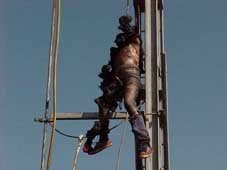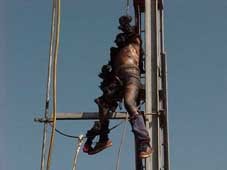Not Even Invisible Specks are Safe from ‘Groid Predation
Posted by alex in nigger crime, South Africa at 8:35 pm |  Permanent Link
Permanent Link
 [From southafricaiscrap blog… Where you learn what its like to live in the middle of a ghetto because the nation is the ghetto.]
[From southafricaiscrap blog… Where you learn what its like to live in the middle of a ghetto because the nation is the ghetto.]
Electricity Thieves Attack Police Trying to Stop Illegal Connections: A South African Tradition Which Costs Untold Millions
While casting my beady eye over which stories to choose for today’s blog – gosh, there are so many – this one caught my attention: in the “coloured� suburb of Reiger Park, Boksburg, yesterday, a mini riot started when local residents attacked police who had come to protect a private contractor sent to dismantle illegal connections to the power gird.
About 500 locals attacked the police, who had to deal with a road blocked with burnt tyres and big rocks. The mob then threw rocks at the cops, damaging three vehicles. Three of the rioters have been arrested and charged with public violence. (Source).
Now here’s a thing, I thought, especially for foreign readers, for who the very idea of electricity theft might even sound bizarre. But it’s true.
This is how it works: you want electricity in South Africa but don’t want to pay for it? Easy-peasy: all you do is climb up an electricity supply pole, or break open a street level supply box, clip on a few wires with crocodile clips, and run the wires back to your house – and viola, you are connected to the power grid. How much easier can it be?
Er, it does however, have a few tiny drawbacks, of course. The first is, well, that you generally are dealing with very high amperages, which are deadly if you touch them – and that, combined with a barely literate “end user� population, well, you know what the result will be: as regular as clockwork, they get fried to a crisp, like this one below:
 Then of course, other people get shocked as well as a result of the shoddy cabling and supply routes. The Cape Town City Council, for example, reported as following about illegal electricity connections in their ‘informal settlements’ : “Illegal electricity connections in these areas are also a problem. Electric wires that are “like spaghetti and all over the place” pose a real danger to firefighters, says Smith. During December, four firefighters were shocked when wiring burnt and fell into water. (Source “City needs shack-dwellers to help prevent tragic firesâ€? Cape Town City Council, 18 January 2006)
Then of course, other people get shocked as well as a result of the shoddy cabling and supply routes. The Cape Town City Council, for example, reported as following about illegal electricity connections in their ‘informal settlements’ : “Illegal electricity connections in these areas are also a problem. Electric wires that are “like spaghetti and all over the place” pose a real danger to firefighters, says Smith. During December, four firefighters were shocked when wiring burnt and fell into water. (Source “City needs shack-dwellers to help prevent tragic firesâ€? Cape Town City Council, 18 January 2006)
So how big can this problem actually be, I hear the skeptics asking. Well, it’s massive, and well in tune with all the other outrageous swindles and exploitation of the (largely White) tax-and municipal levy paying population of this country.
For example, at the very least, 21% of all electricity generated in Johannesburg is lost due to illegal connections (Source) according to that city’s electricity utility company, City Power. They have tried to curb the practice by mounting customers’ meters on poles, on which movement sensors are installed!
In Durban, electricity theft costs the weary taxpayers there at least R30-million a year, according to that city’s official web site (Source)
The Durban (sorry, I mean eThekwini, that’s its new name you know, also based on some mythological never-existed local ‘chief, but that’s another story) electricity supply department also revealed that in the Zamani and Woodyglen settlements in Hammarsdale (just outside the city, but served by it) electricity theft was rife. “In these areas, there are unnecessary faults during peak hours due to illegal overloading. Investigations have revealed that while there are 500 households legally using electricity, 1,500 are using electricity illegally,� a spokesman said. (Source)
Actually, an entrepreneurial electricity thief can turn it into a business: in Hammarsdale, say the eThekwini council, you can get your own electricity supply set up by the crooks for only R20 (1.30 GBP, $2) per month – and they farm out their illegal connection in this way, sucking up power and letting poor old Whitey in Durban pay.
In Pretoria, er, sorry, Tshwane, the city council says it loses R100-million a year due to illegal electricity connections (and another R100 million due to illegal water connections on top of that). A Black Tshwane city council official added, and I agree with him, the “fact that it was happening was indicative of how sick and disobedient society is.� (Source Weekly Municipal Newsletter, 20th March 2006 of the Infrastructure Finance Corporation Limited)
Now, you would think that they would be able to do something about this. And of course, the mealie-mouthed liberal hand wringers always say they are going to do something, but it all comes to crap, like everything else in this country. (oh yes, for foreign readers, ‘mealie’ is corn).
Witness this pathetic underetaking to “eliminate all illegal electricity connections within a year� in Alexandra township, Johannesburg – made in 2002, four years ago! Of course, the opposite has happened: the problem has grown instead of diminishing:
Illegal connections in Alex to be removed
July 19, 2002
A “NORMALISATION PLAN” for Alexandra township aims to eliminate all illegal electricity connections within a year. A roadshow and education programme, which began in June, is under way to “empower people” regarding what City Power hopes to achieve.
“The networks in Alexandra are overloaded with most people in the township being connected to a power point illegally. We hope to have the situation normalised within a year, depending on the support of the people in the township,” says Uyanda Sibiya, media manager of City Power, the city’s electricity utility.
http://www.joburg.org.za/july_2002/alex_electricity.stm Ha Ha.
A connected problem is that of cable theft: both domestic and street lighting. The cabling for the lights along the main Johannesburg highways, the M1 and M2 is stolen “at least once a month� according to City Power (Source) and in desperation, the utility provider has started laying all the cables with concrete – which is all good and well until maintenance is needed.
According to the Electricity Supply Commission, Eskom, they lost R33 million worth of cable stolen in 2004 alone. (Source) And nope, there are no prizes for guessing how they make up these losses. . . you know, don;t you?
Also, of course, the inevitable happens: cable thieves are regularly shocked to death while liberating copper cable from the clutches of those Devil Whites (Source)
Well there you go: as long as the tax-paying population is content to put up with ever increasing utility bills to subsidise the vast majority of users who don’t pay (some 71%, according to the municipalities themselves, see my story below) and the electricity thieves, things will carry on.
Actually, they won’t. Sooner or later the infrastructure will crack under these abnormal pressures and the whole place will make the old joke about Zimbabwe true here as well: Q: In our country’s development, what came before candles and paraffin lamps? A: Electricity.
What a horrible place.
20 July, 2006 at 9:12 pm
These ‘groids think that the power supply is an act of nature, to be exploited. Or, they don’t give a damn about getting power honorably and exploit it.
Subhuman, either way.
But here in America, in my city, the decent, hard-working Whites are made to take up the slack for the ‘groids who cannot (or will not) pay for their utilities. If they did not do this, I suppose the American ‘groids would attack the power supply here.
By the way, I could not log on to the picture of the fried Negro–I sorely needed such an uplifting sight.
21 July, 2006 at 8:26 am
Theft of electricity is a common problem in the slums/housing developments of Mexico and Latin America.
Jesus climbs a pole, taps into the secondary of a transformer, and drops a wire to power a light and a hot plate in his cardboard box home. Some big name American corporations will even deduct the cost of the hot plate from the mestizo employees’ wages.
22 July, 2006 at 10:00 am
Whos Bringing the barbacue sauce?